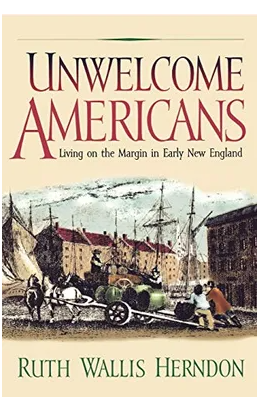
I just finished a great read: Unwelcome Americans: Living on the Margin in Early New England, by Ruth Wallis Herndon, 2001. I had no clue about this part of Colonial history! Here’s what I learned:
In 18th century America, there was no Social Security, Medicaid, unemployment insurance or old age pensions, no welfare of any sort…… “no colony or state created and maintained a safety net for those unable to support themselves.” Thousands of our ancestors living on the margins due to injury, health, discrimination, or poor choices had an extremely rough time just staying alive.” Each local government administered “poor relief” to its own inhabitants and almshouses or poorhouses were constructed so that needy people could be grouped together and helped.
In New England, town officials met regularly to raise taxes due to the high cost of poor relief. This was especially true when the Revolutionary War, with tremendous expenses, loomed. One method sought to resolve this tension was the “warning-out” system. This was the way town authorities sent away from their towns those people who had no legal claim on the town treasury. Through warnings-out, towns avoided the greater costs of supporting frail, ill, or injured people long term.
One facet of this system was that such needy people were shunted back to the town of their birth; being born in XX town, it was XX town’s responsibility to care for them. Sometimes this meant dividing up families! If a family of five were all needy and candidates for being sent elsewhere, they could be sent to five different towns, regardless of the children’s ages.
The book is 200 pages of carefully researched case studies that really brought this situation, this problem, to life for me. Cost for the paperback was under $7 via Amazon books. If you have New England ancestry who were not among the well-off, this might be good history for you.